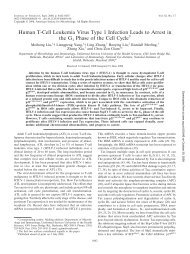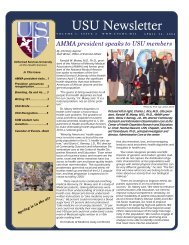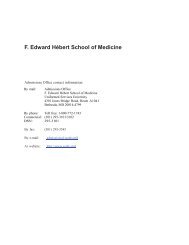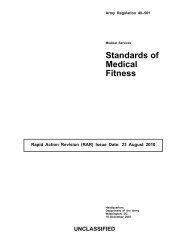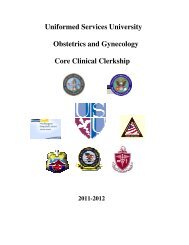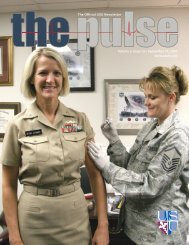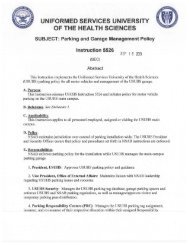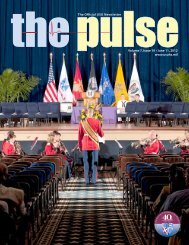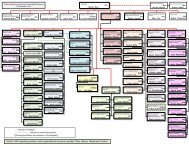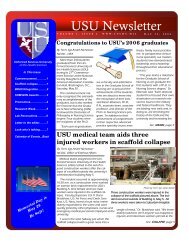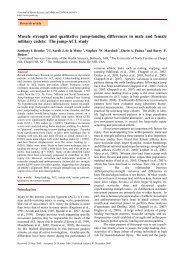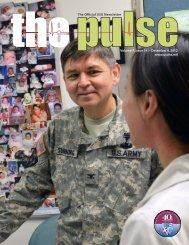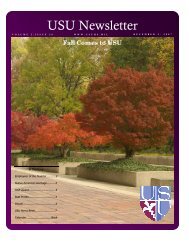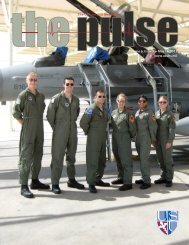Annual Report - Uniformed Services University of the Health Sciences
Annual Report - Uniformed Services University of the Health Sciences
Annual Report - Uniformed Services University of the Health Sciences
You also want an ePaper? Increase the reach of your titles
YUMPU automatically turns print PDFs into web optimized ePapers that Google loves.
SCHOOL OF MEDICINEUSU’s F. Edward Hébert School <strong>of</strong> Medicine (SOM) is a traditional medical school with a curriculumenhanced by specialized education, training and research that prepares graduates to provide leadingedgemedical care in even <strong>the</strong> most challenging environments. A primary mission <strong>of</strong> military medicineis keeping troops healthy, so a core educational focus is on health promotion and disease prevention.USU attracts a diverse array <strong>of</strong> students from all over <strong>the</strong> country, each <strong>of</strong> whom has something special incommon—<strong>the</strong>y are among <strong>the</strong> leaders <strong>of</strong> <strong>the</strong>ir generation, dedicated to serving <strong>the</strong> nation through careersin <strong>the</strong> DoD or Public <strong>Health</strong> Service.Unique EDUCATIONThe SOM’s curriculum is designed to educatestudents to provide outstanding care in even <strong>the</strong> mostextreme settings—to practice good medicine in challengingenvironments. The unique four-year programis year-round and is roughly 700 hours longerthan that <strong>of</strong> o<strong>the</strong>r medical schools. This additionaleducation largely focuses on epidemiology, healthpromotion, leadership and field exercises, diseaseprevention and tropical medicine.The uniformed services <strong>of</strong>fer <strong>the</strong> same specialtyoptions enjoyed by students at civilian schools,as well as unique opportunities in areas includingpreventive and public health medicine. Additionally,concentrations are available in service-uniquepractice areas, such as aerospace medicine,undersea medicine, global infectious diseases anddisaster medicine.A military-trained cadre <strong>of</strong> physicians is crucial to ourcountry’s security and well being. SOM graduatessupport national health and preparedness in manyways, from providing expert medical attentionon <strong>the</strong> front lines to caring for service membersand <strong>the</strong>ir families at medical centers at home andabroad. O<strong>the</strong>rs are called upon to act as “medicalambassadors,” sharing knowledge to help o<strong>the</strong>rcountries enhance <strong>the</strong>ir health care infrastructuresand services. The U.S. Public <strong>Health</strong> Service alsovalues this training because it enables graduatesto manage medical operations in both military andcivilian settings.Sunny Ramchandani, M.D., is an internistand an Assistant Pr<strong>of</strong>essor in <strong>the</strong> Department<strong>of</strong> Internal Medicine. Academically first inhis class at <strong>the</strong> U.S. Naval Academy anda graduate <strong>of</strong> both <strong>the</strong> Harvard <strong>University</strong>School <strong>of</strong> Public <strong>Health</strong> and Yale <strong>University</strong>School <strong>of</strong> Medicine, Ramchandani is quicklydistinguishing himself as a researcher, clinicianand teacher.Dr. Ramchandani recently published apaper with colleagues at Johns Hopkins<strong>University</strong> that was subsequently used by <strong>the</strong>government <strong>of</strong> India to enhance anti-retroviral<strong>the</strong>rapy delivery. In 2007, he also traveledto Afghanistan with USU’s Center for Disaster and HumanitarianAssistance Medicine as part <strong>of</strong> <strong>the</strong>ir initiative to help streng<strong>the</strong>n itshealth care infrastructure.“USU is <strong>the</strong> central resourcefor academic military medicine.If we’re out in <strong>the</strong> fieldconducting research, if wewant to pursue new areas <strong>of</strong>investigation, if we want toenhance training or changecurricula based on real-worldexperience…no matter whatwe need, <strong>the</strong> university is<strong>the</strong> first place we connectwith… The synergy that USUshares with <strong>the</strong> U.S. militaryallows <strong>the</strong> university to <strong>of</strong>feropportunities that aren’tavailable at any o<strong>the</strong>r academicmedical center in <strong>the</strong> country.”4



